GEORGE MASON UNIVERSITY

The

GEORGE MASON UNIVERSITY

The
the Life and Legacy of
English Department Welcomes First Cohort from Yangzhou University
MFA Grad Earns Fulbright to Spain
Folklore Professor Pursues Fieldwork Across Five Countries

Dear alumni and friends,
“I have begun this letter five times and torn it up five times,” James Baldwin writes at the beginning of “My Dungeon Shook,” a letter addressed to his nephew James. This opening underscores the difficulty of writing about a terrible and unfinished history that makes unfair demands on past and future generations of James Baldwins and others who “in the teeth of the most terrifying odds, achieved an unassailable and monumental dignity.” Our cover story gives you some sense of the scope and impact of Baldwin100, the Alan Cheuse International Writers Center’s yearlong celebration of the life and work of Baldwin. Working with partners across Mason and the region, Baldwin100 brings together artists, writers, scholars, and readers to reflect on the impact of Baldwin as a writer and the continuing relevance of his critical vision today. I hope many of you were able to attend the Baldwin Symposium or Nikki Giovanni’s “Jimmy and Me” this past spring—they were fantastic. The fall events are equally exciting, including exhibits and symposia at Mason and lectures, screenings, and performances in collaboration with Strathmore and other regional partners. You will find details about upcoming events at https://cheusecenter.gmu.edu/
Have some news of your own?
Want to get this newsletter electronically?
Send us an email: engnews@gmu.edu
English Matters is produced by the English Department and distributed to alumni twice a year.
The Cheuse Center Celebrates the Life and Legacy of James Baldwin. See cover story, pages 10-11
At this year’s English awards ceremony, we inducted our first class of students to the GMU chapter of the Sigma Tau Delta English honor society. On page 7 you will find the full list of inductees and an account of Professors Jacqueline Burek and Jennifer Linhart Wood ’s contributions to advising the chapter during this charter year. Notably, our chapter of Sigma Tau Delta was the brainchild of recent graduate Alaina Ruffin (English ’23, Honors College, English Honors, summa cum laude, Phi Beta Kappa), who reached out to the national organization and faculty sponsors even as she was completing her degree.
Before I close, I’d like to add something about Zeineb Bouali, who was pursuing an MA in English with a concentration in literature when she passed away in fall 2022. Zeineb was a student in my Introduction to Literary Theory class that previous spring. We were all tiptoeing back into public, masked and cautious but eager for community that semester. Zeineb’s curiosity, openness to challenging and provocative theories, and passion for the study of literature helped make this one of the classes I remember most fondly. Much of Zeineb’s work focused on using psychoanalytic and trauma theory to explore the final section of T.S. Eliot’s The Wasteland, a poem marked by the trauma of WWI. I enjoyed our frequent conversations throughout the semester, both for Zeineb’s warmth as a human and her thoughtful engagement of literature as a student and scholar. I miss her and am glad that we can honor her through a new scholarship fund that should be in place by fall 2025. I plan to contribute when the fund is set up and look forward to remembering Zeineb each time we support other students who are also pursuing their passions.
Working with students, alumni, and colleagues who wrestle with difficult problems, share their passions, and imagine better opportunities for those who follow behind is the greatest pleasure of this job.
Join us when you can by sending us your news, attending our many events, and contributing to our initiatives.
Tamara Harvey Chair, Department of English
english.gmu.edu
Please consider financially supporting our work and the next generation of Mason English students. Your gift will have an immediate impact on the future of our department and the writers and scholars we prepare for the world. To contribute online, visit english.gmu.edu and select “Give” in the top right corner. If you have questions about the levels of giving or named fund opportunities, please contact Eleanor Weis, senior director of development, at eweis2@gmu.edu.
Zeineb Bouali, who had returned to school to pursue graduate studies in English literature after raising her family, died in September 2022 before completing her degree. Her daughters, Ons and Amany, and her husband, Fathi, have been working to create a scholarship to honor her legacy and to support students in Mason College of Humanities and Social Sciences who have had to pause their educational goals or have been displaced and are returning to fulfill their dream of obtaining a degree.
Holly Mason Badra, MFA ’17, who served as Graduate Admissions Coordinator for the English Department and is now Associate Director of Women and Gender Studies, has recently written a tribute to Bouali, including reflections from Bouali’s daughters, to help commemorate the new scholarship.

“Zeineb Bouali was the embodiment of perseverance and determination,” Mason Badra writes in the remembrance, adding that her “legacy is vibrant—just like her smile in these photographs. I am going to hold onto her unabashed joy in the face of hardship.”
The scholarship, which should be available in fall 2025, will be open to both undergraduate and graduate students in CHSS, including to permanent residents, international students, or DACA students. The full tribute, including detailed information on the scholarship, is now available on the English Department website at english.gmu.edu
Local Resident’s Generosity Spreads a Love of Literature
TheEnglish Department enjoyed a great opportunity to spread the love of reading—and of physical books—thanks to a generous donation by local resident Ruth Driscoll-Lovejoy, who donated a nearly complete edition of the Yale Shakespeare to the English Department, with the goal of passing the collection on to an interested and deserving Mason student. English Professor Jacqueline Burek coordinated a contest for Mason students to submit short essays explaining how they would use and enjoy the collection.
Savannah Scott, a PhD student in the Department of History and Art History, ultimately claimed the prize with an essay which discussed her goal of reading all of Shakespeare’s plays, building on some cherished memories of Shakespeare productions she’d attended: “When I think of
Shakespeare, I think of a rainy adventure in London, where I watched Much Ado About Nothing with friends on a study abroad trip. I think of my twenty-first birthday, laughing with friends as we stumbled to our seats for Romeo and Juliet at the American Shakespeare Center.”
As Scott explained at the start of her submission: “Literature has always been an escape for me, a phenomenon many people can relate to. Allowing yourself to get lost in a book, even for a few minutes, is a small luxury in this fast-paced world.”
Two runners-up in the contest, both undergraduate English majors, also received prizes: Madison Perino earned a pocket edition of Romeo & Juliet also donated by Driscoll-Lovejoy, And Kat Benson was awarded a copy of The Norton Shakespeare donated by English professor Jennifer Linhart Wood


The Yale Shakespeare Series gathers all of Shakespeare’s plays and poetry, along with Shakespeare of Stratford, a handbook for students by the original editors, Wilbur L. Cross and Tucker Brooke. The set of 40 volumes, elegantly presented in blue cloth bindings, was originally published between 1918 and 1921.
Aileen Walls, BA English Award: Pariya Sabti
Dr. Barry Berkey Personal Essay Award: Molly Cabral, “La Casa di Michael” (see page 6)
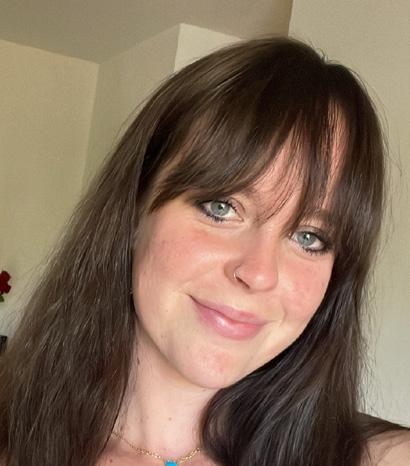
Charlie Jones Awards:
Molly Cabral, BA ’24, won the Dr. Barry Berkey Personal Essay Award for the second year in a row for her essay “La Casa di Michael.” Read the full essay on page 6.
• Kai Knowles-Pappas (2023-2024)
• Shadden Alfadhil (2022-2023)
James L. Jackson Award in English: Grace Davidson
Lathbury at Random Award: Ang DiNardo

to our 2023-2024 award winners and honorees!

Elektra Katsonis, BA ’24, was named the Outstanding Graduating Student in Honors and also won—at the graduate level—the Margaret R. Yocom Student Paper Prize for “Family Identity, Co-Narration, and Interaction in Conversational Family Storytelling of the Unexplainable.” The award is named for retired Mason folklorist Margaret “Peggy” Yocom.
Margaret R. Yocom Student Paper Prizes
• Elektra Katsonis, Graduate, “Family Identity, Co-Narration, and Interaction in Conversational Family Storytelling of the Unexplainable”
• Samantha Coyne, Undergraduate, “Diaspora and Immigrant Narratives in Irish Myth and Folklore”
Robert Karlson Award: Olivia Bissell
Sven Eric Molin Award: Grace Calamita
Writing Center Consultant of the Year: McKenan Bundy

McKenan Bundy, a current MFA student, was named Writing Center Consultant of the Year.
Hosted by Mason’s Provost, Summer Research Fellowships provide financial support to graduate students during the summer term, allowing students to devote significant time to their dissertation or thesis research. Twenty MFA students were awarded fellowships this past summer. Congratulations to Robert Scott Bianco, Jordyn Marie Bostick, Jessika Bouvier, Brianna Chapman, Kara Crawford, Merron Douglas, Jaime Goh, Esther Goldberg, Ashlee Green, Connor Harding, Lauren Hornbuckle, Judy Leserman, Elena Macdonald, Josie Mckenzie, Homa Mojadidi, Faith Palermo, Victoria Reynolds, Nicholas Ritter, Taylor Schaefer, and Kylie Pat Smith.
Mark Craver Poetry Award: Arpita Roy, “Onlookers: A Dialogue”
Dan Rudy Fiction Prize: Connor Harding “A Pound of Cure”
GMU Rinehart Awards:
• Martheaus Perkins, Fiction, “To the Honorable Judge Donovan and the Parole Board”
• Ashlen Renner, Nonfiction, “The Guest Star”
• Taylor Franson Thiel, Poetry, “Upon Taking the Sacrament”
Mary Roberts Rinehart Nonfiction Award:
Robert Scott Bianco, “Tayloriad”
Honors Graduates
• Elektra Katsonis, Outstanding Graduating Student in Honors
• Tasia Ahmasi
• Livia Benjamin
• Esraa Dafaalla
• Hadeel Elbackush
• Domi Hannon
• Jester Hutchinson
• Luke Jennings
• Benjamin Kovacev
• Eve Lowery
• Varvara Mikhalchuck
• Kathryn Shoemaker
• Rysa Rahman
• Pariya Sabti
• Jessica Weiss
CHSS Outstanding Student
• Pariya Sabti (BFA)
• Varvara Mikhalchuk (BA)


Honors graduate Varvara Mikhalchuk, BA ’24, was named a CHSS Outstanding Student.
Outstanding Graduate Students
• Holly Bergman, MFA Nonfiction
• Adam Cutter, MA Linguistics
• Amanda Ellard, MA Folklore
• Damian Massie, MA Literature
• Sophia Ross, MFA Fiction
• Eric Spiegel, MA Professional and Technical Writing
• Alexandra Swords, MA Cultural Studies
• Lloyd Wallace, MFA Poetry
• Junyi Wang, MA Teaching of Writing and Literature

MFA Thesis Fellows
Outstanding Graduate Student Eric Spiegel, MA Professional and Technical Writing
• Ashlee Green, Nonfiction
• Connor Harding, Fiction
• Nick Ritter, Poetry
Alan Cheuse International Writers Center Fellows
• Jessika Bouvier
• Darcyn Gross
• Faith Palermo
OLLI-Mason Scholarships
• Serena Grant (BFA, Creative Writing)
• James Moser (BA, English-Linguistics)

Linguistics students (l-r) Shadden Alfadhil and Kai KnowlesPappas were honored with the Charlie Jones Award, named for the esteemed linguistics professor, who died in 2016, and Adam Cutter was named Outstanding Graduate Student in Linguistics.
By Molly Cabral
Michael comes to the restaurant three night a week. Sometimes he comes all six nights that we’re open, and sometimes he skips a few weeks in a row, claiming to be bored of the food, but I know it’s really because his money is running low. He walks through the door with an air of entitlement, like we are being blessed with his presence. He dresses like he’s meeting a date, always in dress pants and a formal jacket, clothes perfectly ironed, hair gelled, and cologne heavy. His appearance is important to him.
Via Veneto has been open for about forty years now, and Michael has been a patron for all forty of those years. I’ve been waiting tables at the restaurant for four years and have gotten to know Michael on a very personal level. Because it’s such a small business, with a customer base that’s been coming to eat since 1984, the owner and I have learned much about our regular customers, with or without their consent. I know that Michael was wealthy—very wealthy—but in the past year he’s started to use a different credit card to pay for each of his meals. I know that he spent a significant amount of time in the hospital for reasons he won’t speak of, followed by a small stint in jail—something he couldn’t pay his way out of this time. I know that this past year has changed Michael from an arrogant, boisterous, pretentious man into a person who looks permanently lost, like his time has finally caught up to him.
Michael sits at the same table, one of our few tables that seats five people instead of four, placed right in the middle of the restaurant. He refuses to sit anywhere else. If he happens to come in on a night where that table is already in use, he will leave, shooting me or the owner a dirty
look on his way out. He says he likes the table because he’s able to see everything around him, but I know it’s because he just wants to be seen. Michael is lonely, the kind of lonely that cannot be fixed by another person’s company or by being surrounded by people in a small restaurant on a Friday night.
Michael was married for thirty years and had four children before his wife left him. He still refers to her as “his wife” and when he hits a certain number of negronis or martinis, whichever poison he’s picked for the night, she’s all he can talk about. Michael is sixty-five now, the same age as my dad. His youngest daughter is a few months younger than me. I cannot help but draw parallels between his life and my father’s, who quit drinking the day I was born. I cannot help but imagine it was my own father, sitting alone in a tiny, dark restaurant, pining for the life he could have had, but lost by his own volition. Michael is likeable when sober, he is tolerable when tipsy, but he is loathsome when he is drunk.
I pity him, I can’t help it. My dad has always told me that when people show you who they are, believe them. My dad doesn’t think that people are salvageable, but I am most drawn to the debris.
When you’ve worked in the industry for a certain period of time, it becomes easy to tell the different kinds of loners apart. The people that come to dine alone because they’re looking for an hour of peace away from their busy life, and the people that dine alone because they don’t know how else to escape their loneliness. Michael sits at his designated table, the same one he once sat at on his first date with his ex-wife, and I know he is waiting for her to return.
Last night, Michael started slurring after his first drink. He was wasted—the drunkest I’d ever seen him—and I insisted that he call an Uber to get home. These nights were my least favorite. I had spent countless of them chasing him out of the restaurant to his truck, which he parks strategically away from the big windows that face the parking lot of the Italian restaurant so we can’t see him slinking away when he’s had one too many.
He took a hard fall a year or so ago, and now he walks slower, with a limp, so he can’t escape as quickly. So my successes in taking his keys and leaving him to wander on foot have dramatically increased in number than the years before. After I forced him to call himself an Uber, Michael stood and disconnected his coat from the chair next to him. The charismatic smile dancing across his face couldn’t hide the defeat in his eyes. As he walked unsteadily to the front door, he winked at me like we shared an inside joke, I smiled in defeat, my lips matching his eyes.
After he made it out the door, I waited a minute and followed, making sure his Uber had arrived and he wasn’t sneaking out to his truck in its secret spot. I was surprised to see he hadn’t, that he was right outside the glass door, adjusting his jacket and his hair. He wanted to look presentable for whoever might perceive him next.
I stood for a while, just watching him. I felt the same feeling that always surfaced when Michael made an appearance at Via Veneto. I felt sympathy, empathy, I still can’t decipher between the two.
He said “you know you love me” on his way out, his usual statement at departure when he knew he’d upset his audience, his final attempt at trying to connect. But I do. I love him because I pity him, and I resent him for the same reason. And still, I hope for his wife’s return.
Molly Cabral graduated this spring with a bachelor’s degree in English, with a concentration in Literature; this is the second year in a row that she has won the Barry Berkey Personal Essay Award. She is from Alexandria, Virginia but feels most at home on the coast of New England, where most of her family resides. She is happiest outside, surrounded by animals, where she can freely daydream without the fear of interpersonal interaction.
The Dr. Barry Berkey Personal Essay Award is presented to a student majoring in English their junior or senior year. The award and a $500 prize are made possible by the gift of Velma Berkey in honor of her husband, Barry, both longtime supporters of Mason and writers themselves. This year’s contest was judged by MFA nonfiction students Ashlen Renner and Holly Bergman.
This spring, Mason’s English Department became home to a new chapter of Sigma Tau Delta, an International English Honor Society with more than 875 chapters around the world. Founded in 1924, the society honors high achievement in English language and literature at the undergraduate, graduate, and professional levels; strives to promote interest in literature throughout campuses and their surrounding communities; and celebrates “exemplary character and good fellowship,” among other goals.
Preparations for Mason’s chapter began in September 2023, with Professor Jacqueline Burek stepping up as faculty advisor. Nearly 40 graduate and undergraduate applicants for membership were ultimately approved for induction, either as part of the highest 35% of their respective classes or with grade-point averages of 3.3 or higher.
“Mason’s new Sigma Tau Delta chapter not only recognizes the high academic achievement of our students, who work across a wide range of concentrations within our English Department, it also offers our students a dynamic and inclusive community built upon the love of language,” says Professor Jennifer Linhart Wood, who helped spearhead plans for the new chapter. “As a student-led, faculty-sponsored organization, Sigma Tau Delta works to foster literacy and cultural inclusivity both on and beyond Mason’s campus through upcoming service projects that attest to the power of words to transform the world.”
The first class of inductees was officially announced at the Department’s Spring 2024 Awards Ceremony.
Officers for the new chapter include co-presidents Leah Azmi and Emma Shaw, vice president Sydney Sullivan, secretary Sariya Scribner, and historian Cole Pryzby
The other inductees are Daniel Mark Abernathy, Tasia Ahmasi, Miguel Alexis Alves, Grace Baker, Alexander J. Bastani, Katarina Benson, Xiomara Byrd, Lainey Brooks, Martha Castro-Hernandez, Gracie Davidson, Hadeel Mahmud Elbackush, Anna Erickson, Cara Hadden, Dominique Hannon, Mikayla Hart, Sophia C. Hart, Haley Haverson, Amber Nicole Ignatowski, Eve Marie Lowery, Rachel Lutsky, Thomas McKenzie, Varvara Mikhalchuk, Evangeline Miller, Jennifer Miller, Nicolas Moro, Anastasia Pestova, Maryanne N. Rogers, Sariya Scribner, Rafaella Silva, Jacob Rainer Swartz, Eric George Taylor, Emily F. Williams, and Erin Zellner.
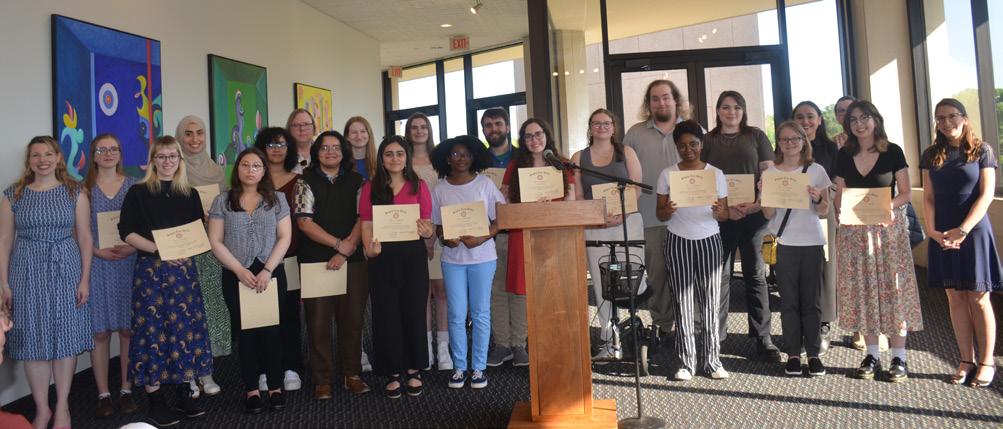
Imagine this: you are a first-time residential advisor at a coastal university, and there is a hurricane forecast to make landfall in a few days. You’re worried about the 46 students you serve and the risks the storm could pose to your job, which you rely on to stay in school, and you also have epilepsy. You must decide what to do in the days leading up to the storm, and what to do when the hurricane makes landfall. Should you help evacuate the students, as your job requires, or head home, as your mother wants, to avoid an anxiety-induced seizure?
This scenario was created by MFA fiction student Lyz Duesterhoeft, who worked as part of a team of 11 scientists and students researching factors that “shape public perceptions of extreme weather risk” and how an understanding of those factors can help encourage preparedness. More than 150 U.S. college students participated in the study, which relied on two visualizations of data—”standard weather forecasting graphics versus 3D computer graphics visualization”— and a “narrative about a fictitious storm, roleplay, and guided discussion of participants’ concerns,” according to the study “Risk Perception and Preparation for Storm Surge Flooding: A Virtual Workshop with Visualization and Stakeholder Interaction,” published in the July 2023 issue of Bulletin of the American Meteorological Society.
Duesterhoeft began working with the study team as an undergraduate at Mason for an OSCAR project through the Office of Student Creative Activities and Research as she pursued a degree in Environmental and Sustainability Studies. Two other members of the team have Mason ties as well: Julia Hathaway, PhD Communication ’19, now working in Communications and Outreach for the U.S. Environmental Protection Agency, and Katherine Rowan, BA English ’72, now Emerita Faculty in the Department of Communication.
“There was a surprising range of disciplines in the team,” says Duesterhoeft, “from at-
mospheric scientists to a psychologist, to communication experts, and even another humanities person like myself, and everyone worked to ensure that all members of the team felt included and integral.”
In this project, Duesterhoeft oversaw the creation of a cast of characters who were placed into a fictitious scenario: a forecast hurricane, expected to cause storm surge flooding on a coastal college campus. The characters in the scenario spanned a range of different experiences and perspectives—from a student afraid to evacuate to his home because of his rough family life to the provost of the university, mostly concerned about a wife and a dog. Workshop participants listened to Duesterhoeft’s narrative, which she composed and read aloud to them, and then discussed each character’s need for wellbeing, autonomy, and justice as well as ways in which the forecast created problems for each. A discussion tool called the ethical matrix—defined in the BAMS article as a “collective decision-making tool that elicits diverse perspectives based on the lived experiences of diverse stakeholders”— was used to guide facilitated discussions of the characters’ dilemmas.
For Duesterhoeft, her inspiration for these complex characters drew largely from her experience as a Mason student.
“My time as a non-traditional undergraduate student at Mason helped inform some of the ways in which I designed the narrative for the study’s workshop mostly by having been at Mason for a handful of years at that point and observing other students around me,” says Duesterhoeft. “Mason has a diverse student population, both in traditional and non-traditional students, so I used that as part of the inspiration for some of the characters. I also drew upon the relationships I had with some of the faculty for similar inspiration for some of the non-student characters in the narrative. I also held Mason’s campus as a whole in my mind when writing about the physical space the study’s fictional campus inhabited.”
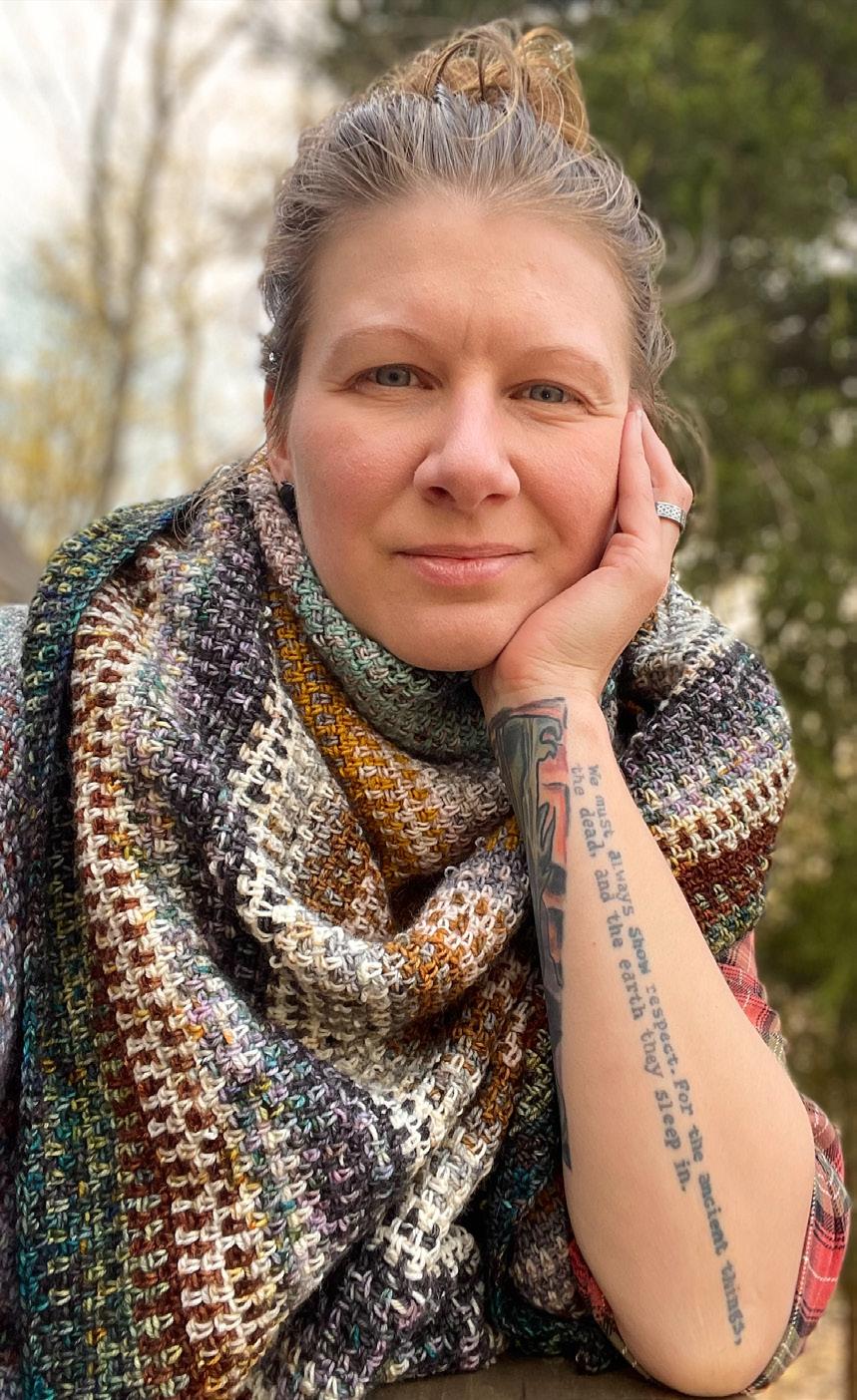
While Duesterhoeft’s involvement in this project has been minimized to accommodate her enrollment in Mason’s MFA program, she is still actively working on the study.
“Communicating about severe weather risk in ways that encourage people to take care— of themselves and others—is important and challenging,” said Hathaway, one of the study’s authors. “Multidisciplinary research can yield innovation, especially when teams include individuals with diverse knowledge. Lyz’s narrative was so compelling that workshop participants were quoting lines from it in their feedback on the workshop. This is remarkable because these students were brought together online from across the nation and were working quickly to complete the workshop on deadline. Many did not know one another. Lyz’s narrative, and its characters with their compelling dilemmas gave them believable challenges to analyze. Her story-telling skills are helping us, as social scientists, explore the role of storytelling in a novel way, with real-world promise for building community resilience against the increasing risk of flooding in a warming world.”
— Merron Douglas, BFA ’22, current MFA fiction student
This fall, a cohort of 17 students from Yangzhou University, China, begin their studies in Fairfax as English majors at Mason. In a dual degree program, these students will receive a degree in Translation Studies from Yangzhou, their home institution, and a BA in English with a concentration in literature from Mason.
When these students arrived in August, they had already completed their first year of studies at Yangzhou. They will spend two years in Fairfax and return to Yangzhou for their fourth and final year as outlined in the China 1+2+1 Program, an initiative of the China Center for International Education Exchange (CCIEE) and the American Association of State Colleges and Universities (AASCU).
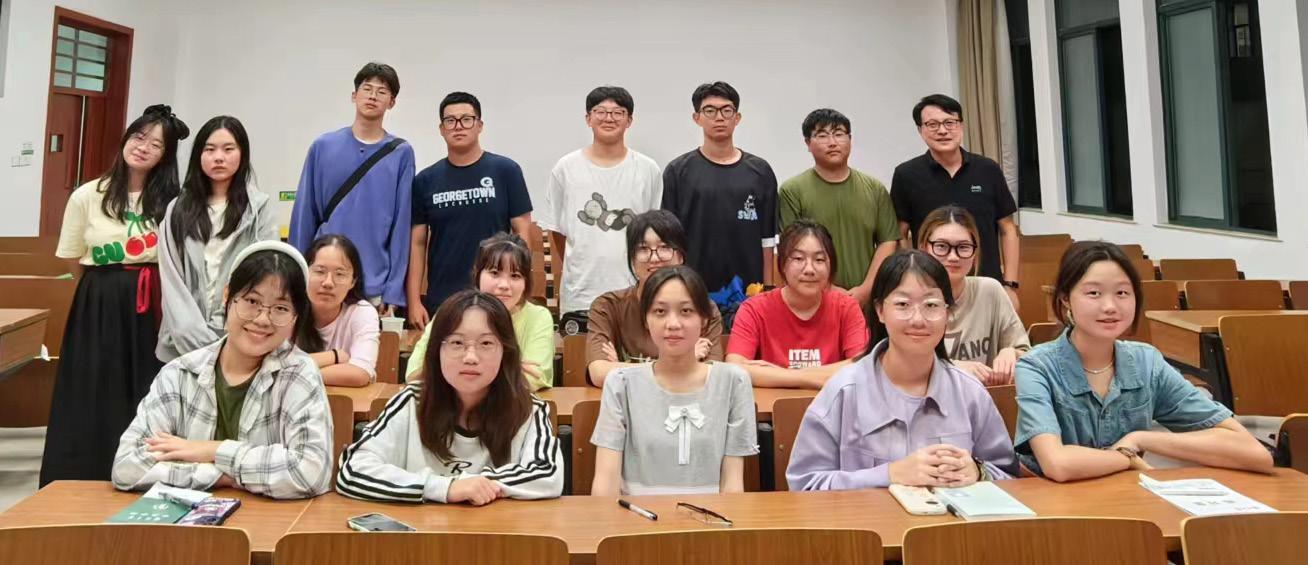
China 1+2+1 students decide to come to the U.S. for a variety of reasons, from wanting to position themselves for graduate study in the U.S. to wanting to improve English language skills and expose themselves to Western culture.
The students from Yangzhou University took English 301, their first Mason course, this summer from China. The instructor, Associate Professor Liz Paul, worked with them on Zoom and will support the cohort in Fairfax as the English Department’s International Student Liaison.
“We are excited to welcome this cohort to the English department,” said English Department Chair Tamara Harvey. “The range of disciplines in our department and
our longstanding emphasis on global and multilingual approaches to literature and culture makes us a perfect partner for this kind of initiative.”
Mason has been part of the China 1+2+1 program since 2004, with students coming individually and forging their own course of study—nearly half of them in business, but with large concentrations of students in the Humanities and Social Sciences and in Engineering. In Spring 2021, the Schar School of Policy and Government hosted its first cohort of students from Nanjing Normal University with a focus on Public Administration. The English Department’s new cohort is the first such initiative at Mason focused on the humanities.
Poetry Daily, the online poetry journal based in Mason’s Creative Writing Program, has been awarded a Poetry Fund grant from the Academy of American Poets, in collaboration with Amazon Literary Partnership.
“Apart from our great excitement at receiving a grant selected by the Academy of American Poets, one of the most prestigious poetry foundations in the United States, we are so proud of the students who worked on and submitted this grant application,” said Professor Sally Keith, one of Poetry Daily’s editorial co-directors. “This grant will help fund Poetry Daily’s operations, including paid professional opportunities for Mason students to gain experience in publishing and the expansion
of Poetry Daily’s grassroots poetry activism in the community.”
In addition to support for staff and operational needs, these funds will be used to support the digitization of the curriculum for Poetry Alive!—a program which introduces poets and poetry to students in the Fairfax Juvenile Detention Center—and other resources for the poet-participants.
“We’re grateful for the opportunity to continue championing the vital work of poetry organizations and presses in partnership with Amazon Literary Partnership, uplifting underrepresented writers and communities of readers all over the nation through the Poetry Fund,” said Ricardo Maldonado, President

and Executive Director of the Academy of American Poets.
Read more here: https://poets.org/ academy-american-poets-announces2024-poetry-fund-grant-recipients

“James Baldwin described himself as a witness,” Keith Clark, Distinguished University Professor of English and a specialist in African American Literature, explained recently. “He brought to light things in the 1950s and ’60s that people did not want to see about sex, race, and politics. And he was prophetic, he was prescient. The things we read about in Baldwin’s book The Fire Next Time — divisions in these ‘yet-to-be-United States,’ as he called them, the grasping for power—people are seeing all this playing out right now. Did Baldwin write this in 1963 or did he write this last year? His words then may be even more resonant now. We still have so much to learn from him.”
August 2024 marks 100 years since the birth of James Baldwin, an African American writer whose debut novel, Go Tell It On the Mountain (1953), has been ranked by both Time Magazine and Modern Library among the 100 best English-language novels of the 20th Century, and whose other best-known works include the novels Giovanni’s Room (1956), Another Country (1962), and If Beale Street Could Talk (1974), and the essay collection Notes of a Native Son (1955).
As centennial celebrations roll out across the country and around the world, the Alan Cheuse International Writers Center has coordinated with community leaders and regional groups to organize Baldwin100, a year’s worth of events at Mason and throughout the DC region exploring Baldwin’s life work, his long legacy, and his continuing impact on society today.
“ We conceptualized Baldwin100 in May 2023, based on a suggestion by Alan Cheuse’s wife and Cheuse Center board member, Kris O’Shee,” said Leeya Mehta, director of the Cheuse Center. “Given that we are an international writers center, we focused on three things: an international Baldwin who sees America from outside, love, and great literature and art. A critical piece of community engagement is for our own region to read and respond to Bald-
win’s work in communal settings, so that we are less isolated as readers, and we build that immediate sense of a civic and public life. So, with hosts within Mason, as well as outside partners like Fairfax City, Fairfax County Public Library, the Osher Lifelong Learning Institute, Busboys and Poets, Reston Community Center, and Strathmore, we created a Watches and Reads list to facilitate programs across the region and then participate in them.”
Reading and watching, responding and discussing—the programming and resources for Baldwin100 have already provided myriad opportunities for engagement, with more ahead.
In April, for example, the Cheuse Center hosted several events at Mason’s Fairfax Campus. The symposium “Why Baldwin Matters,” featured a talk by David Leeming, author of James Baldwin: A Biography, who was then in conversation with Keith Clark, and a panel with Nicholas Delbanco, professor emeritus of the University of Michigan, Deborah Tulani Salahu-Din from the National Museum of African American History and Culture, and Mason English major Rae Mitchell. Other events included a screening of rarely seen documentaries about Baldwin, and a lecture, “Jimmy and Me,” by award-winning poet Nikki Giovanni.
This fall offers several more events on Mason’s Fairfax campus, including an exhibition in the Gillespie Gallery of Art inspired by Nothing Personal, Baldwin’s collaboration with photographer Richard Avedon, and a staged reading of Baldwin’s Blues for Mister Charlie on September 9 at the Center for the Arts. Another symposium, at Gillespie Galery on September 16 at noon, “Meditations on Masculinity and Sexuality in the Art and Life of Baldwin,” will feature Clark, undergraduate Shane Stevenson, and GerShun Avilez, a scholar of African American literature and LGBTQ Studies at the University of Maryland. At 1:30 that day, Alison Landsburg, professor in Mason’s Department of History and Art History, will lead a program
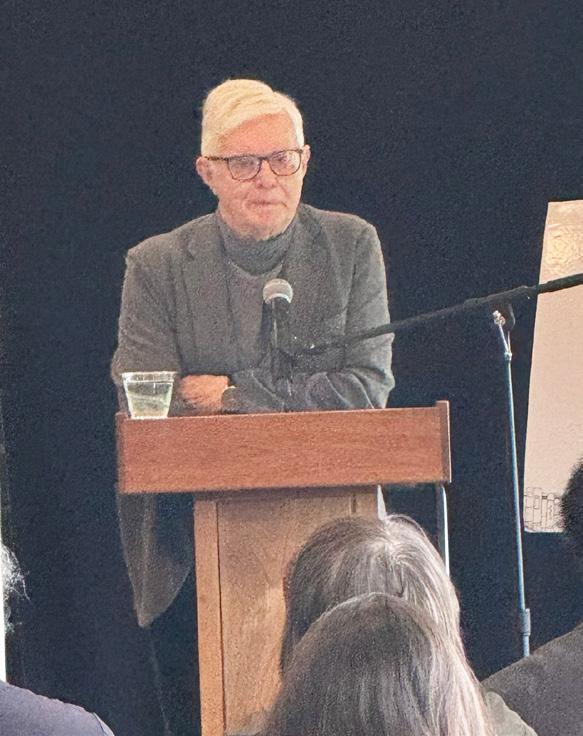


featuring women artists talking about their own work and Baldwin’s through the lens of trauma.
Off-campus, Clark has participated in several events, including a February Community Reads program focused on The Fire Next Time at the Arlington Public Library and, more recently, on August 2—Baldwin’s 100th birthday— a post-screening discussion of the film James Baldwin: The Price of the Ticket at the AFI Silver Theater and Cultural Center in Silver Spring in conjunction with Strathmore. That documentary will have future screenings at the Reston Community Center and through the Fairfax County Public Library, which are also hosting community reads of Baldwin’s work. Clark will speak at several
of these events as well, and the Baldwin100 Read and Baldwin100 Watches pages of the Cheuse Center website features suggested readings, links to films, and discussion questions for groups to use on their own.
“The open-source nature of the programs is that they are meant to be borrowed and meant to be inspirational so that new initiatives come out that create a broader ‘collective of artists,’” explained Mehta, and she pointed to Baldwin’s own emphasis on collaboration, with Avedon and others, as a model. “What we see with great writers like Baldwin is that they work in collectives with others who nurture them, like artist Beaufort Delaney and opera singer Marian Anderson.”
One of the final components of the Cheuse Center’s focus on Baldwin’s work is an emphasis on love. Talking about Baldwin’s repudiation of the church as an institution, Clark explains, “Baldwin had to leave the pulpit in order to preach the gospel, as he phrased it. And that gospel was about love. It sounds facile, but it was radical. And it’s anathema to what America’s core objectives are, sadly— power and money.”
Mehta echoes these statements: “Baldwin unites us in our humanity. Especially for students in my classes, his writing speaks directly to them. His work is about love, and the price of love. We all understand that.”
For more information on Baldwin100, reading and film resources, upcoming programs, and the full list of sponsors and partners, visit cheusecenter.gmu.edu/baldwin100.
Support for Baldwin100 has been provided by a Mason ARIE [Access to Research and Inclusive Excellence] grant. In addition to Mehta’s and Clark’s work, foundational work for the project was completed by Watershed Lit Associate Director Alice Magelssen-Green, Mason School of Art Professor Jessica Kallista, MFA ’01, Cheuse Board Chair William Miller, MFA ’87, Mason Exhibitions, CVPA and Mason Libraries teams, and Andy Shallal, who hosted the Busboys and Poets Lecture by Nikki Giovanni. For more information on hosts/partners, please visit the Cheuse Center web site.
From a curricular standpoint, the celebration of Baldwin resonates with Mason’s “Just Societies” initiatives—part of the university’s ongoing “commitment to preparing students to act in a diverse, global world”—and specifically with the English Department’s new course offerings in this direction: English 206, “Literature in the Creation of Just Societies.”
The specific learning outcomes of courses with the “Just Societies” flag including promoting “meaningful, respectful engagement with others” across a wide range of diversities: “diversity of origin, identity, circumstance, and thought,” including more specifically “political beliefs, race/ethnicity, religious beliefs, sexual and gender identity” and more— themes that Baldwin explores again and again in his own fiction.
“Baldwin is just one writer,” Leeya Mehta, Cheuse Center Director, explained. “But his witnessing of injustice disturbs and rouses us to connect as individuals to a just society.”
Keith Clark, Distinguished University Professor of English, is teaching one of the sections of 206 this fall—“Sexual Identities in African American Lit”—and including Baldwin’s work on the syllabus. As he embarked on prep for the course, Clark reflected on his own path to Baldwin and subsequent changes in both the classroom and the world in recent decades.
“In the dark ages when I was an undergraduate at William and Mary, we didn’t have African American literature courses,” Clark said. “Shakespeare, Chaucer, Hemingway, O’Conner, but no black folks. I mentioned my interests to a British literature professor, and he suggested Go Tell It TO the Mountain”—emphasizing the incorrect title. “The World Book Encyclopedia had just a paragraph or two on Baldwin, and a bad photograph, but it said his books dealt with race and homosexuality. I was a 19-year-old man dealing with race issues and homosexuality myself, and in retrospect, my British lit professor and his mangled title threw me a lifeline, and this led me to a senior honors thesis on Baldwin with Professor Joanne Braxton, who’s been a mentor to me, and to a doctoral thesis on Baldwin.
“My English majors today, they’ve heard of Baldwin and have often read his story ‘Sonny’s Blues’—that’s the good thing about African American literature now being considered part of American literature—and they come with a keener understanding of sexuality and sexual difference, a more nuanced way of thinking about Baldwin, gender fluidity, and transgender issues. When I started teaching in ’93, teaching Another Country, students would bristle a bit at the sexual issues. Now, no problem. My students today are more open, they’re more ready, and their enhanced vocabulary about sexuality has also instructed me.”
Other sections of this Fall’s English 206 courses include “Literature and Film of the Holocaust,” taught by Richard A. Nanian, “Science Fiction and Social Justice,” taught by Jessica Hurley, and “Beyond the Binary,” taught by Parker O’Connor


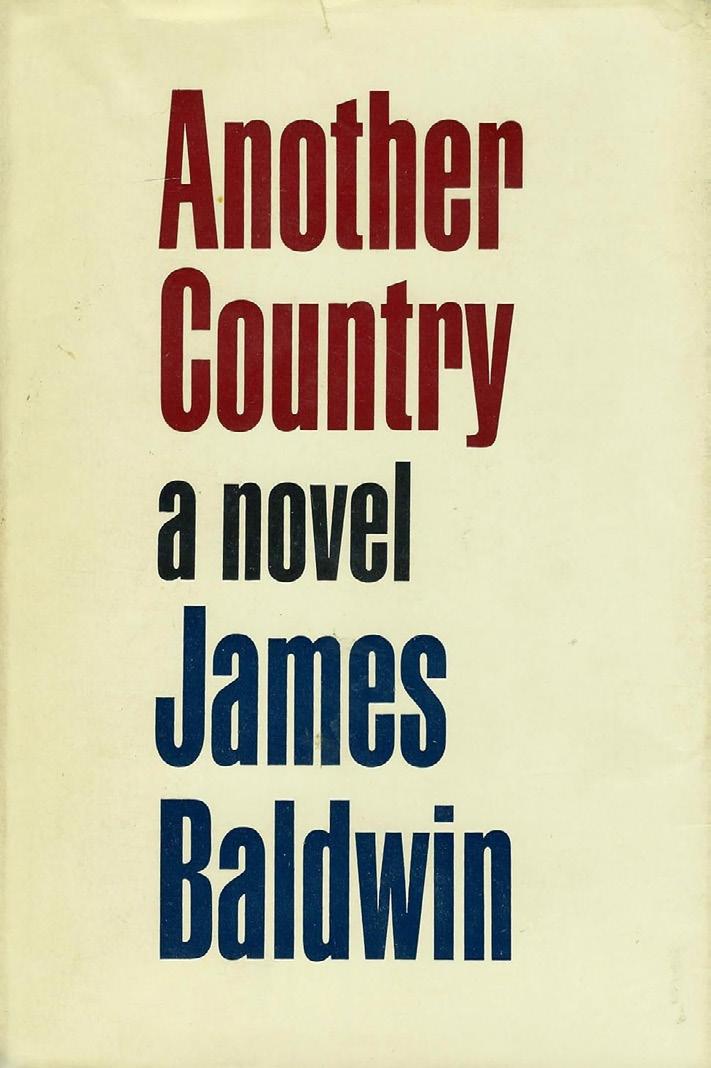
Moriah Allen, MFA ’14, is now the chair of the English and Foreign Languages Department at York Technical College in Rock Hill, SC. Allen recently worked with a cross-departmental group to launch Titan’s Muse, the college’s first literary magazine. The student-driven magazine celebrates the creative work of the college’s student population.
P.J. Devlin, MFA ’11, earned a firstplace ribbon for fantasy fiction for her novel, The Chamber, A Wissahickon Creek Story; the award was presented in April by the Chanticleer International Book Awards as part of an annual writers conference in Bellingham, WA.

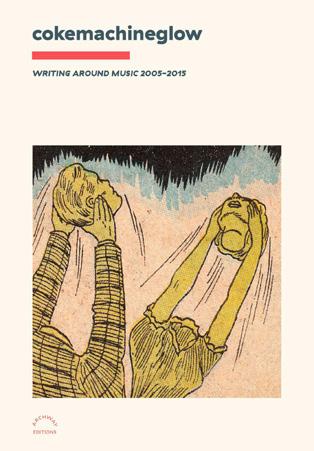
Corey Beasley, BA ’07 and MFA ’11, was featured in the anthology, cokemachineglow: Writing Around Music 2005-2015, gathering some of the best writing from a website that focused on music journalism and gained a devoted following in the blog era of internet writing. Beasley contributed to cokemachineglow from 2013-2015 and co-edited the site in its final years.
Darbyshire Burge, a current BFA student, won the Sharon Draznin Award for Excellence in Judaic Studies for the essay “Ehyeh Asher Ehyeh: Translations of Exodus 3:14 and Concepts of Gender Identity.” Mason’s Judaic Studies program presents the award each year to an outstanding undergraduate essay written on a Judaic Studies topic.
Priyanka Champaneri, BA ’05 and MFA ’10, received a 2024 National Endowment for the Arts Creative Writing Fellowship.
Gracie Davison, BA ’24, won the “Innovation in Methods and Ideas” award at the CHSS Undergraduate Research Symposium this spring for her thesis project, “Fungal Fictions,” working with Professor Jessica Hurley as her thesis mentor.
Danielle Cadena Deulen, MFA ’05, won the Lambda Literary Award in Bisexual Poetry for Desire Museum, her third poetry collection.

Merron Douglas, a current MFA student, had a flash fiction story, “ShortTerm,” published in Common House Magazine
Andy Fogle, BA ’96 and MFA ’00, had a new collection published by Main Street Rag Press. Spurred by his mother’s death and driven by early 2020’s pandemic and racial unrest, Mother Countries excavates both family and national history.
Three Mason MFA poets celebrate new collections at the AWP Conference in Kansas City. Pictured from left to right: Emily Tuszynska, MFA ’02 and current adjunct professor, with her first book, Surfacing (Grayson Books poetry award winner, January 2024); Cynthia Marie Hoffman, MFA ’03, with her fourth fulllength collection, Exploding Head (Persea, February 2024); and Lisa Ampleman, MFA ’04, with her third full-length collection, Mom in Space (LSU press, January 2024).
Ashlee Green, a current MFA student, had an essay in Thrillist: “In Iceland, Everyone Has a Björk Story.”
Joe Hall, MFA ’08, has a new book, People Finder, Buffalo, a collaboration with book designer Mike Corrao, published by Cloak in May. Additionally, recent poems have appeared in Oversound and Protean Magazine.

Connor Harding, a current MFA student, had a flash fiction story, “Speedway Families,” published in the magazine Flash Frog.
Jeffrey Harmon, BA ’10, joined the Institute for Defense Analyses (IDA) as an Executive Assistant in the Operational Evaluation Division of IDA’s Systems and Analyses Center. IDA is a nonprofit corporation that operates three federally funded research and development centers to address U.S. security and science policy questions.
Rajpreet Heir MFA ’16, wrote “Some Other I Before Me: On Seeking Guidance From AAPI Memoirs,” including reflections on Mason professor Kyoko Mori, for the Los Angeles Review of Books in May.
Sara Henning, MFA ’07, has a new collection from Southern Illinois University Press; Burn offers “a lyrical meditation on time, survival, and merciful moments of joy.”
Spencer Hixon, BA ’08, is the author of A Sinister Love, his debut novel from Wootton Major Publishing, an indie/ hybrid press.

Emilio Iasiello, MFA ’98, has a new book, Frank and Me. The coming-of-age novel, about a young boy wrestling with the truth about his grandfather, was released in August.
Alyse Knorr, MFA ’17, was named a finalist for the Lambda Literary Award for Lesbian Poetry for her collection, Ardor. Knorr also has a new collection, Wolf Tours, forthcoming from Fulcrum Press in September.


Tara Laskowski, MFA ’05, won the Agatha Award for Best Contemporary Novel at the Malice Domestic Conference for The Weekend Retreat
Robbie Maakestad, MFA ’17, had a short story, “Bill Murray Likes to Dress Up as Jesus When He Creates an Altercation,” in Whale Road Review in April 2024, and an essay, “On Creation, Pneumothorax, Death, and the Breath of God,” in Anatomical Sciences Education in a January/ February 2024 special issue focused on the “Intersection of Spirituality and Anatomy.” In February, he also joined fellow alums Rajpreet Heir, MFA ’16, and Samuel Ashworth, MFA ’18, on the panel “We Can’t All Marry Rich: Teaching Creative Writing Students Professional Skills” as part of the AWP Conference in Kansas City. More great news: Maakestad recently received tenure at Point Loma Nazarene University.
Abigail Mills, a current MFA student, had three flash fiction stories published in the Spring 2024 issue of the Santa Clara Review: “Can You Remember Her Face?” “Metal Nest,” and “Burn Scars.”
Homa Mojadidi, a current MFA student, has translations of three Rumi ghazals forthcoming in Washington Square Review. Additionally, her own ghazal, “Blue,” appeared in the spring issue of Blue Mountain Review.
Elisabeth Murawski, MFA ’91, has several recent poems to celebrate: “Little Polish Girl” in The Wild Umbrella; “Of Rams and Japan” in Kyoto Journal; and “Behold Thy Mother” in The Hudson Review.
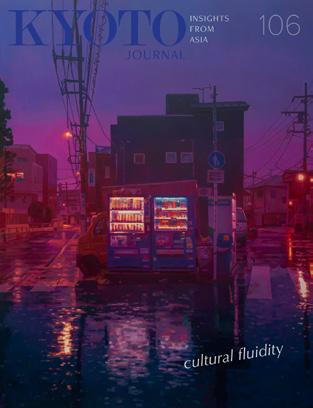
Allen Nguyen, BFA ’23, wrote an essay on S.S. Van Dine’s The Canary Murder Case for the Library of Congress blog “Timeless: Stories from the Library of Congress.”
Jihoon Park, MFA ’22, had a short story, “Werner Herzog Can’t Sleep,” in the Spring 2024 issue of Puerto del Sol
Martheaus Perkins, a current MFA student, had two poems in the Spring 2024 issue of Harpy Hybrid Review: “Optometry with Momma” and “The Welfare Queen Pyrate Code.” Darby Price, MFA ’14, has a debut book forthcoming in June 2025: the lyric memoir All the Lands We Inherit from Black Lawrence Press.
Sharon Ritchey, MFA ’05, had her debut novel The Pelican Tide, under her pen name, Sharon J. Wishnow, published in June by Lake Union Publishing. The novel focuses on a struggling Cajun chef living in Grand Isle, Louisiana in the aftermath of the Deepwater Horizon oil spill.
Lori Rottenberg, MFA ’24, had two new prose poems in December Magazine: “Proof” and “Obituary.”
Christian Teresi, MFA ’06, has a new book of poems, What Monsters You Make of Them, forthcoming in September from Red Hen Press.

Taylor Franson
Thiel, a current MFA student, had a poem, “An Ode to Crying,” published by Volney Road Review, and four poems in the Spring 2024 issue of Happy Hybrid Review: “Erumpunt et Operimentum,” “In my Dream I See a Monkey,” “The Mothers,” and “For What Would You Kill?”
Nate Thomas, BFA ’24, had his first published essay, “Jazz Funeral,” in Furrow Magazine. The essay recounts a show at Preservation Jazz Hall and the second line funeral of Kerry “Fatman” Hunter.
Ellen Weeren, MFA ’19, has recently published two stories: “All’s Fair in Love and Teacher Gifts,” published in Streetlight Magazine and “More Than Ice Cream” in Hunger Mountain.
Andrew Joseph White, BFA ’19 and MFA ’22, has a third novel forthcoming in September: Compound Fracture Additionally, his second novel, The Spirit Bares Its Teeth, won a Stonewall Honor Award, recognizing “exceptional merit relating to the gay/lesbian/bisexual/ transgender experience.”


Chelsea Lebron, MFA ’24, has been awarded a Fulbright English Teaching Assistantship to Spain, one of the most competitive Spanish-speaking ETA programs. She will work as a teaching assistant at Universidad de La Laguna (ULL) in the Canary Islands with two other Fulbright grant recipients. During her time at George Mason University, she researched cultural ghost stories throughout South America as a 2022 Cheuse Center MFA Travel Fellow. While in the Canary Islands, Chelsea plans to continue writing while learning about Spanish folklore and history.
Alongside teaching English, she plans to run community creative writing workshops in her host country emphasizing folklore, ghosts, and monsters. As she continues to hone her Spanish skills, Chelsea’s ultimate dream is to help bilingual Hispanic writers craft stories that bridge between Spanish and English without sacrificing their voice. She hopes her time in Spain will push her closer to her goal of teaching creative writing workshops to incarcerated bilingual writers. — Esther Goldberg, current MFA student
After more than 30 years at Mason, Professor Ken Thompson retired at the end of the Spring 2024 semester.
Ken began teaching for the English Department in 1993. The Department was growing, beginning endeavors such as Mason Topics, English courses linked to other disciplines, writing courses for online media, and the like—all of which benefitted significantly from Ken’s insights, experience, and unending curiosity. As he rose through the ranks, from part-time instructor to fulltime Term Professor, Ken focused on adaptations, from literature to film to digital media, and on teaching in courses linked to Engineering and other disciplines in Mason Topics and other learning communities.
Ken also taught in the BIS program (which he directed for a few years), forging connections between students and faculty from diverse disciplines. Ken engaged with
his students, developing their interests with valuable insights into the histories of the technologies they were using, from ARPAnet through to the World Wide Web.
He instilled in his students the importance of communicating effectively to diverse constituencies; engineers, for example, don’t just communicate with other engineers, but with the public, with supervisors, and with end-users. In his literature courses, he similarly focused on adaptation, detailing how a text such as Frankenstein changes as it transitioned from an epistolary novel to a short Edison film and then to various full-length film versions.
Ken used his skills effectively. When Ken (and I, as well as many others) were hired, term faculty could be renewed for a maximum of five years. Ken, along with other term faculty, lobbied the Department and the University to lift that cap. And here we
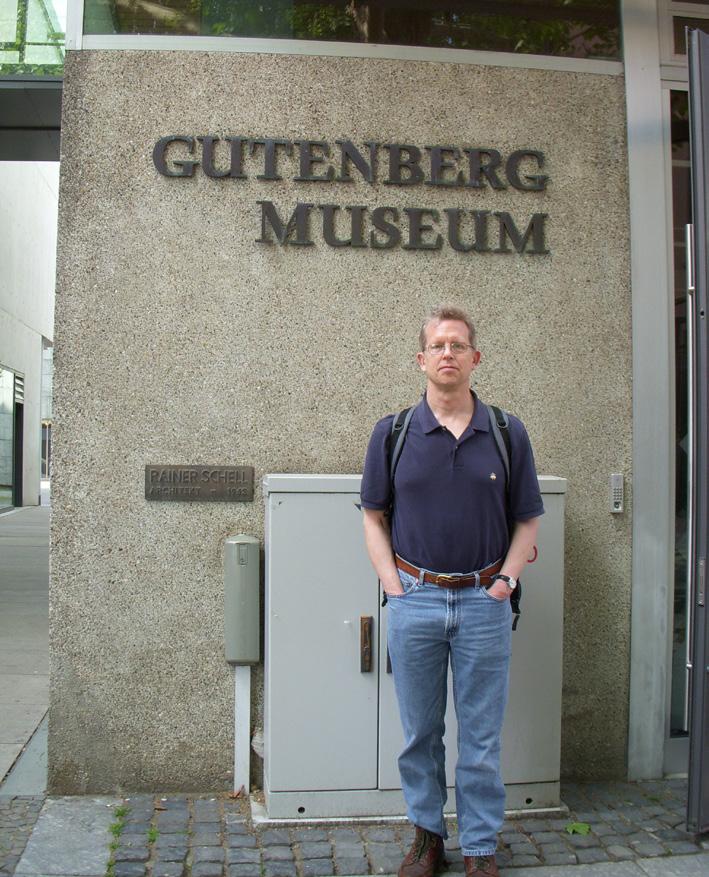
are, 30 years later. I join the other faculty in sincere thanks for all that he has done.
Ken and his wife Jackie enjoy travelling, and they will be relocating to upstate New York after retirement.
— Dean Taciuch, Professor
Steph Liberatore, MFA ’14 and now Associate Professor of English, debuted the flash nonfiction journal In Short in late May; Liberatore developed the journal during a Term Faculty Study Leave in Fall 2023.
“I’m so proud of In Short’s first issue and grateful to the Term Faculty Study Leave program for the opportunities it provided,” Liberatore said. “The time away not only helped me fill an important gap in the literary landscape but also generated internships for undergrads, reading opportunities for grad students and alums, and even a new course on online literary publishing in Spring ’25. I can’t wait to see the ripple effects the project will continue to have on the flash nonfiction community.”
The first issue features flash, micro, and short-short nonfiction—all of which can be read online here: https://inshortjournal.com/home/ our-issues/issue-1-spring-24/
One of the contributors to the debut issue is a Mason alum—Rajpreet Heir, MFA ’16—and other Mason students and alums served on the editorial side to support the publication. Jasmine Haskins, a current BFA student, and Dan Piper, BA ’24, both worked as editorial interns, and readers for submissions included current MFA students Jessika Bouvier, Shellie Kalinsky, and Elena Macdonald and several alumni of the English Department: Erica Dolson, MFA ’14, Audrey Morales, BA ’22, K.R. Mullins, MFA ’24, Suehaila Nabulsi, BA ’00, and Harris PlesKovitch, BFA ’23.

Eric Anderson contributed the article “Ecologies of the Undead: George Saunders’s Lincoln in the Bardo and the Limits of the Ecogothic” to the 50th Anniversary Issue of Studies in American Fiction, a special issue focusing on Ecogothic. Anderson’s review of Never Whistle at Night: An Indigenous Dark Fiction Anthology was published by Los Angeles Review of Books

Jennifer Atkinson’s poems “A Clear Jar” and “Night Vision” were part of the program Voices Up! with String Trios in early April at Fordham University’s Lincoln Center Campus in New York. The program set the poetry of Fordham University Press poets to music by composers David Wolfson and Laura Jobin-Acosta.
Michael Don has several recent and forthcoming short stories—“Sneak Peek” in Baltimore Review, “Postmemory” in The Alan Squire Publishing Bulletin, and “Freedom Isn’t the Right Word” in Brazenhead Review and a foray into humor, “Please Replace the Acknowledgements Page of My Novel with This,” appeared in Defenestration.
Isidore Dorpenyo received the 2024 Ken Rainey Award for Distinguished Research from the Society for Technical Communication. The Ken Rainey Award honors research that has made positive, significant contributions to technical communication practice and teaching, and the Society noted how “Isidore’s work at the intersection of election technologies and international technical communication has made significant contributions to sustained conversations about social justice and civic engagement.”
Eric Eisner co-edited the volume The Romantic Period for the recently released 11th edition of The Norton Anthology of English Eisner was one of seven new editors for the anthology series, “chosen through rigorous review, recommended by colleagues from many different schools and known for the depth and creativity of their scholarship.”
Ariel M. Goldenthal, MFA ’17, recently had two experimental flash pieces published: “At Twelve Years Old, I Draft a New Custody Agreement” was published by Exposition Review and nominated for a Best of the Net award, and «Two Imaginings of a Conversation We Will Never Have» was published in Bending Genres.
McKinley Green received the 2024 Dr. David Powers Corwin Teaching and Scholarship Award from Mason. The award “recognizes the contributions of faculty whose teaching and/or scholarship centers the experiences of LGBTQ+ people and communities, focuses on gender and sexuality, and/or grounds their pedagogy in queerness, justice, and liberation.”
Anna Habib, MFA ’ 03, earned her PhD in Writing and Rhetoric at Mason in Spring 2024; her dissertation is titled Linguistic Justice, Translingualism and the Lived Experience of Language: The unraveling of what once felt intact. Additionally, Habib, Mason professor Esther Namubiru, Nancy Henaku of the University of Ghana, and Rose Richard of Stellenbosch University have a book contract with the WAC Clearinghouse’s International Exchanges for the Study of Writing book series for the edited collection Writing Research from the African Continent, scheduled for publication in February 2026.
Helon Habila was presented with the KabaFest Lifetime Achievement Award at The Kaduna Books and Arts Festival in Nigeria in April. The award celebrated his “exceptional writing and significant contributions to the development of literature globally.” Additionally, Habila served as “curator in residence” for the Berlin Literary Festival, helping to plan their 2024 events schedule; the festival will take place in September.
Paul Haspel presented an early draft of his paper “Abandoned Roanoke: A 16th-Century Mystery, Interwar Anxiety, and Historical Speculation in Paul Green’s The Lost Colony” at the Mid-Atlantic Popular and American Culture Association conference in Philadelphia. The paper subsequently appeared in the Summer 2024 issue of the North Carolina Literary Review and has now won the Paul Green Prize, presented annually to encourage research and scholarship on the plays of Paul Green.
was on the teaching faculty of the Bread Loaf Writers’ Conference this past summer.
Erika Kielsgard, BA Psychology ’13, won the 2023 International 3-Day Poetry Chapbook Contest for her debut chapbook, Lamprey (Harvard Square Press); Lamprey was released for the Great Lakes Poetry Festival at the Peter White Public Library in Marquette, MI in late April.
Samaine Lockwood delivered the keynote address at the symposium “Queer New England” at Historic Deerfield in March of 2024. Her address was ”Jewett & Company’s Slow Tourism: Regionalist Literature, Queer Women’s Travel, and White Belonging at the Turn of the Twentieth Century.”
Kyoko Mori’s latest book, Cat and Bird, was published by Belt Publishing. The memoir recounts “Mori’s relationship with the six house cats who defined the major eras of her life as a writer: Dorian, Oscar, Ernest, Algernon, Miles, and Jackson.”

Eric Pankey has a new collection of prose poems, The History of the Siege, from Codhill Press. The poems were “written and gathered together in an era of pandemic, rising authoritarianism, war, and climate crisis.”
E. Shelley Reid’s college writing textbook, Rethinking Your Writing, has been published as an open-access online book with WACClearinghouse Press.
Catherine E. Saunders presented a paper titled “Finding Belinda Brown in Unexpected Places: Traces of a Black Wife, Mother, and Independent Thinker in a Lost Cause Narrative” at the Virginia Forum conference in Richmond in April.

Sally Keith has a new poetry collection from Milkweed Editions: Two of Everything explores “the season of waiting that precedes adoption.” Keith also has recent or forthcoming poems in American Poetry Review, POETRY, and Adroit, and Mason composer Jesse Guessford used her poem “Knot” for a composition which had its world premiere in April at the Dewberry School of Music concert Flying to the Stars: Da Vinci and Beyond. Finally, Keith
Sylvia Schreiner presented three conference talks this spring: “Capacity-building through strengthening awareness: Community linguistics in a language revitalization context” for the Symposium on American Indian Languages 2024 at the University of Arizona in Tucson, Arizona ; “Imperfectives as spatiotemporal predicates” for CHRONOS 15 at the Université Jean Jaurès in Toulouse, France; and “Language and culture instruction in a language endangerment context” with Nanik Joelaine Annogiyuk and Avruuy Miriam Toolie for the Language Ideologies and Inequality with a Perspective on the Arctic Conference at the University of Greenland.
Art Taylor, MFA ’06, has four new short stories: “We Keep the Wall Between Us As We Go” in Mystery Tribune; “Two for One” in Murder, Neat: A SleuthSayers Anthology; “Dark Thread, Loose Strands” in Ellery Queen’s Mystery Magazine; and “The Gained Ground” in the anthology Midsummer Mysteries. Additionally, Taylor received two Anthony Award nominations from Bouchercon, the World Mystery Convention, in the category Best Anthology/Collection: for his collection The Adventure of the Castle Thief and Other Expeditions and Indiscretions and for an anthology he co-edited, School of Hard Knox: Stories That Break Father Ronald Knox’s Ten Commandments for Detective Fiction
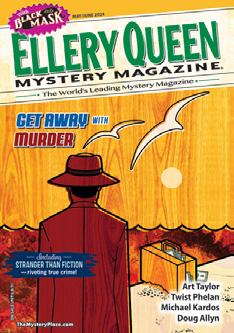
Professor Lisa Gilman, director of the English Department’s Folklore Program, has been working on a global, multi-site project focused on the arts and cultural dimensions of the refugee “crisis” in five countries to understand better the cultural impacts of migration, the creativity and entrepreneurial initiatives of displaced peoples, and what structural systems and policies are needed to better address refugees’ cultural sustainability along with acceptance and integration into their new environments.
The book project “My Culture, My Survival: Arts Initiatives by Refugees for Refugees,” an ethnographic and transdisciplinary endeavor, counters homogenizing negative discourse about “refugees” by humanizing and bringing visibility to the lived experience of diverse displaced peoples across the world: Uyghurs in France; Syrians in Türkiye; Congolese, Burundians, and Rwandans in Malawi; Rohingya and transgender people in Bangladesh; and people from diverse backgrounds in the Washington, DC area.
Emily Tuszynska, MFA ’02, had a poem published in the March issue of Scientific American; “Want” was inspired by the owls that nest in Mason’s West Campus woods. Additionally, Tuszynska’s first poetry collection, Surfacing, was published in January; see the boxed announcement about a trio of alumni poets with new books in Alumni/Student News, page 13.
Jennifer Linhart Wood was a guest speaker for the Shakespeare Theatre Company’s performance of As You Like It. Joining two Beatles experts, Wood talked about how Shakespeare incorporated music into his plays—connecting the scholarly background with STC’s incorporation of the Beatles’ music into the production. The talk is now available on YouTube.
Alok Yadav has been named Director of Mason’s Center for Humanities Research, which supports humanities research by faculty and doctoral students through semesterlong fellowships, summer research grants, presentations, panel discussions, workshops, and more. Yadav served on the CHR Steering Committee for several years before stepping into the director role.
Congratulations to professors Liz Paul and Albert DeFazio for earning 2024 teaching awards from Mason’s Stearns Center for Teaching and Learning. Paul earned a Teaching Excellence Award with “Special Recognition in Inclusive Teaching,” and DeFazio won an Online Teaching Excellence Award.
MFA student Esther R. Namubiru’s interviews with Paul and DeFazio can be found at https://english.gmu.edu/articles.
Gilman was awarded a State Department Council of American Overseas Research Centers’ Multi-Country Research Fellowship to fund a final phase of research in France, Türkiye, and Bangladesh in Summer 2024.
She has also been working to spread the word about these scholarly and academic endeavors to popular audiences. Her essay “ YOLO Art Center and Café: Art, Culture, and Belonging for Syrian Refugees in Türkiye,” with photographs of artists, performers, and more connected with the art center, was published in Folklife Magazine, a publication of the Smithsonian Center for Folklife and Cultural Heritage. She also coordinated The Dzaleka Art Project, a community-based project and collaboration between youth living in the Dzaleka refugee camp in Malawi and George Mason University students. Youth living in the camp documented the vibrant art scene in the camp, which Gilman and Mason students produced into the website https:// www.dzalekaartproject.com.
In related news, Gilman has recently been accepted to be a Residential Fellow with the Woodrow Wilson International Center for Scholars for the 2024-2025 academic year, where she will be working with the Refugee and Forced Displacement Initiative.
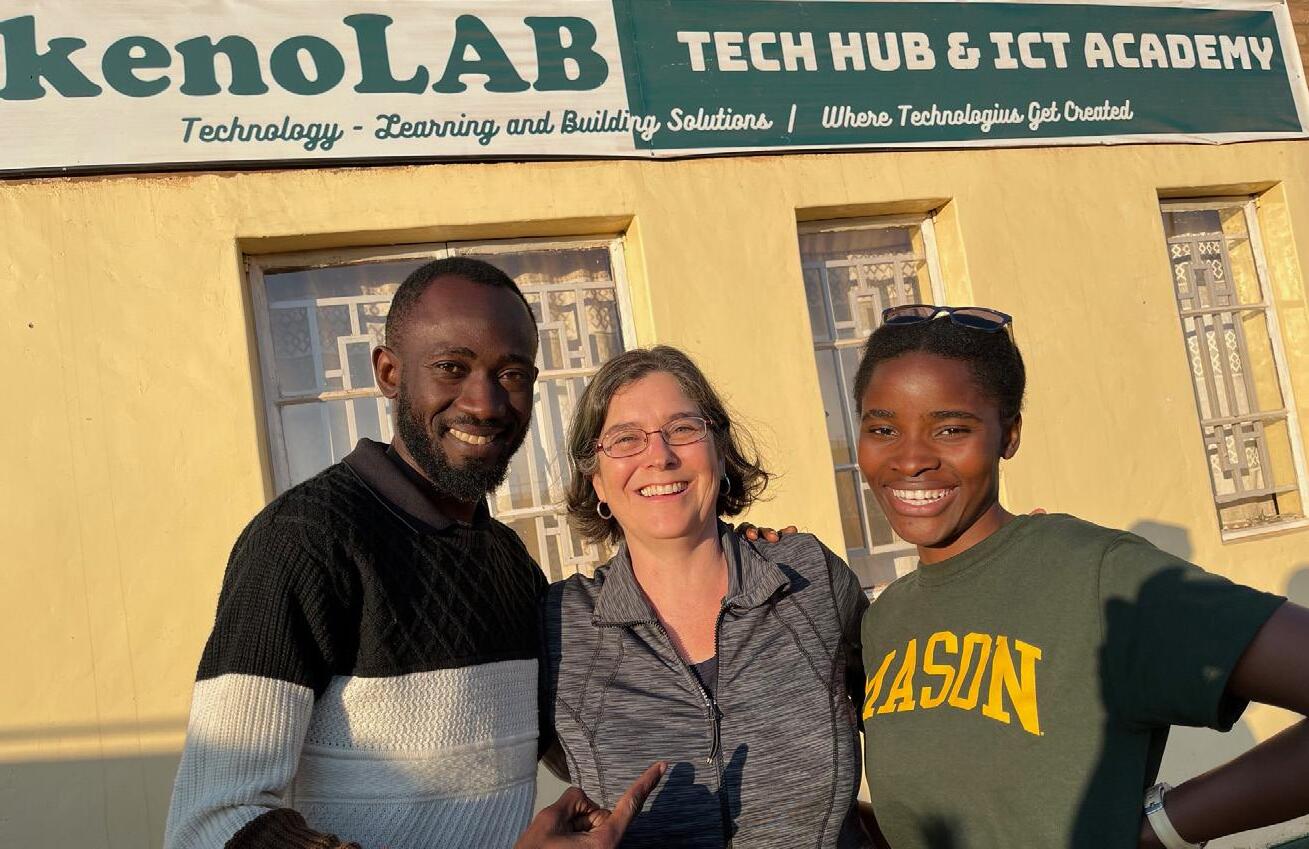
This October, Fall for the Book is celebrating its 26th Annual Festival with five full days of events from across the genre spectrum, and a headline event on October 16 with Lessons in Chemistry author Bonnie Garmus. Starting on Saturday, October 12, Fall for the Book continues its partnership with the City of Fairfax’s Fall Festival to host a slate of children and adult programming in Old Town Hall, Fairfax, including graphic novelists John Gallagher and Jamar Nicholas, children’s author Patricia Tanumihardja, and genre-bending novelists Constance Sayers and Alisa Alering. From October 15-18, the festival heads to Fairfax County Library branches, George Mason’s campus, and onto Zoom and YouTube for dozens of other events, including two MFA Alumni Readings. The poetry alumni featured this year are Emily Tuszynska, Siwar Masannat, Kate Partridge, and Alyse Knorr. The prose alumni include John Copenhaver, Sean Murphy, Noley Reid, and KE Semmel
The Creative Writing Program joins Watershed Lit and Mason’s University Libraries in presenting the Fall 2024 Visiting Writers Series.
Two landmark festival events are celebrating their lucky seventh year: the Beck Environmental Lecture, and the New American Voices Award, which celebrates immigrant writers. For the latter, three finalists will be joined by judges Myriam J. A. Chancy, V. V. Ganeshananthan, and Karin Tanabe. Additional events include poets A.B. Spellman, Jason Schneiderman, and Willie Lee Kinard III, novelists Etaf Rum, Eunice Hong, Rania Hannah, and Keith Donohue, memoirists Ani Gjika and Agata Izabela Brewer, and many more. Visit fallforthebook.org for the schedule and come out to Mason and the City of Fairfax to enjoy the full lineup of readings, panels, discussions, and more.


V.V.
Thursday, October 17, 6 p.m. — Part of the Fall for the Book Festival
Evening programs will be held in person on Mason’s Fairfax Campus—either at 6 p.m. (for events co-presented by Fall for the Book) or at 7:30 p.m. with venues to be announced later. Visit creativewriting.gmu.edu for updated information as it is released.
Thursday, September 26, 7:30 p.m.
Andrew Bertaina is the author of the short story collection, One Person Away From You, which won the 2020 Moon City Press Award in Short Fiction. He has a collection of essays, The Body is a Temporary Gathering Place, coming out in 2024 with Autofocus Books.
Wednesday, October 16, 6 p.m. — Part of the Fall for the Book Festival
Aaron Burch is the author of the memoir with literary analysis Stephen King’s The Body; the short story collection, Backswing; and the novella, How to Predict the Weather. He is the founding editor of HOBART
V. V. Ganeshananthan (she/her) is the author of the novels Brotherless Night, a New York Times Editors’ Choice, and Love Marriage, which was longlisted for the Women’s Prize and named one of the best books of the year by The Washington Post
Friday, October 18, 6 p.m. — Part of the Fall for the Book Festival
J. Michael Martinez is the author of four collections of poetry, including Heredities, which received the Walt Whitman Award from the Academy of American Poets, and Museum of the Americas, which was selected for the National Poetry Series Competition and long-listed for the 2018 National Book Award in Poetry; his most recent work is Tarta Americana.
DON MEE CHOI (POETRY)
Thursday, November 21, 7:30 p.m.
Don Mee Choi is the author of the KOR-US trilogy: Mirror Nation, the National Book Award winning collection DMZ Colony, and Hardly War


